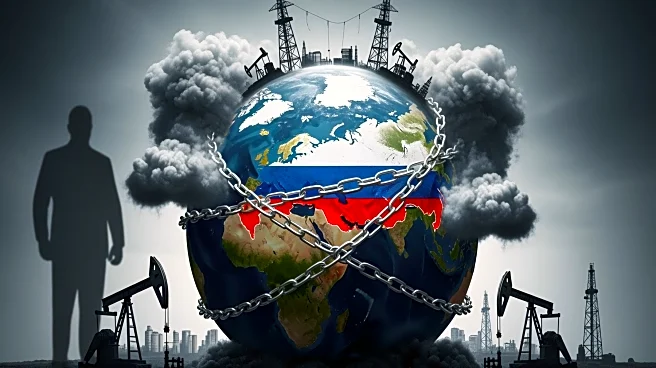What's Happening?
President Trump has imposed significant sanctions on Russia's leading energy companies, Rosneft and Lukoil, as part of a strategic move to pressure Moscow into peace negotiations. This decision follows a recent call between President Trump and Russian
President Vladimir Putin, during which Russia maintained its firm stance on its demands. The sanctions target the core of Russia's war economy by crippling its energy sector, a major source of revenue for the Kremlin. In a coordinated effort, the European Union has also implemented its own sanctions, including a ban on Russian liquefied natural gas imports, further impacting Russia's financial resources.
Why It's Important?
The sanctions represent a critical step in the U.S.-led effort to apply economic pressure on Russia, aiming to force a change in its aggressive policies. By targeting the energy sector, the sanctions strike at a vital component of Russia's economy, potentially weakening its ability to sustain military operations. The move is significant for international relations, as it demonstrates a unified stance between the U.S. and its European allies against Russian aggression. The sanctions could lead to economic repercussions for Russia, potentially affecting its global trade relationships and internal economic stability.
What's Next?
The next steps may involve further tightening of sanctions, particularly targeting Russian oligarchs who support the Kremlin's war efforts. The U.S. and its allies might expand the list of sanctioned individuals and entities, seizing assets and closing loopholes to prevent circumvention. The ongoing pressure campaign aims to compel Russia to reconsider its position and engage in meaningful peace talks. The international community will be closely monitoring Russia's response and any potential shifts in its foreign policy.
Beyond the Headlines
The sanctions raise ethical and legal questions about the use of economic measures as a tool for achieving political objectives. There is also a cultural dimension, as the sanctions could impact the Russian populace, potentially leading to domestic unrest. Long-term, the sanctions might influence global energy markets, prompting shifts in energy supply chains and encouraging investment in alternative energy sources.















